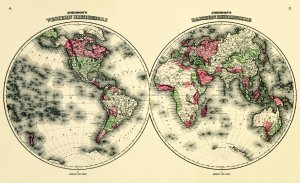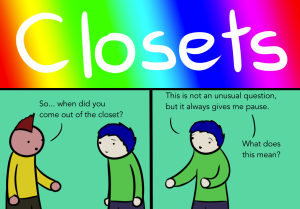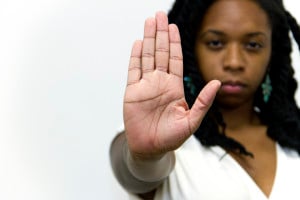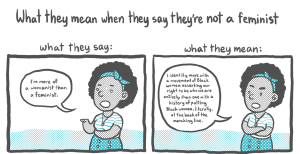
A young person standing against a grey brick wall, gesturing a “thumbs up” sign with each hand.
I have tried to write this letter for years. I used to think that I needed to apologize to my younger self for never letting myself claim both my Blackness and my Latinidad. I constantly told myself I had to “pick a side” and it caused me a lot of harm and extreme feelings of racial and cultural isolation.
I thought I couldn’t be Black because I wasn’t born in the United States. Then I thought I couldn’t be Black because I had an accent. Later, I thought I couldn’t be Latinx because none of my non-Black Latinx friends could fully understand my day-to-day interactions with the world.
But especially, I thought I couldn’t be Latinx, because everywhere I went, I was labeled “African American,” “mulatto,” “negro,” and so on.
But, the reality is that there’s no need for me to apologize to my younger self and there’s no need for you, my fellow Afro-Latinx sibling to apologize because there is no manual on how to navigate being both Black and Latinx.
If you are reading this, I hope you understand that being confused is not your fault, that having questions is okay, and that you’re not the first to learn to accept your full Black self and your full Latinx self.
Let me get something clear: you are not an impostor!
You do not need to explain to anyone why you’re Black, why you’re Latinx, or which identity you feel closer to. We, Afro-Latinxs are out here and, at some point in our lives, we have felt, and we will feel a little lost. But that’s just the process of living at the intersections of two beautiful cultures, herstories and blueprints of resistance.
If there’s anything I have learned is that we, as an Afro-Latinx community, need to first let go of the mindset that we are only x% Black or x% Latinx. When we begin to think of percentages, we begin to see one identity as less important, which is something that as people of color, we cannot let happen as it erases our experience as mix-race people.
Thinking of percentages not only separates us, it also recalls a history of Jim Crow laws in the United States and the history of erasure that African descendants have in other parts of Latin America and the Caribbean such as Mexico and the Dominican Republic.
For example, in the Dominican Republic, anti-Blackness has manifested itself in anti-immigrant laws, where many dark-skin Black people have been ripped away from Dominican citizenship because the government states that they are Haitian Descendant, and thus, not Dominican. This mentality is rooted in the legacy of colonialism that the island has, as well as in White Supremacist practices where the darker a person is, the less valuable they are, and thus, expelled from the country.
So, in order to step away from this “I’m only x% Latinx and x% Black,” it is important to acknowledge each other, and that means understanding that we might not always know how to interact with the world.
For this reason, I want to share a list of affirmations that I have come to learn, as my family and I learn to celebrate our Blackness and our Latinidad in healthy and compassionate ways.
1. You Have a Right to Your Blackness and Latinidad
I was about thirteen years old when I found out I could be both Black and Latinx. I had only been speaking English for a couple of years, but knew enough to serve as a translator for my mom when we visited the neighborhood free clinic.
I remember the nurse asking us for our race, and I said “Mexican.” The nurse smiled at me, and said, “that’s not a race.” She proceeded by asking, “are you White Hispanic, Black Hispanic, or Other Hispanic?”
I didn’t understand, but I said “Black Hispanic,” since my mom would refer to herself as “negra,” every once in a while.
It took me a few years, actually, to understand the difference between race, ethnicity, and culture. And even later, I had to reflect on identifying as Hispanic, instead of correcting the nurse and said Latinx. But, I was thirteen, and I’m still learning.
The point is that you can be both because Latinidad is not a race, it is a culture and an umbrella term for various ethnicities in Latin America and the Caribbean. For example, someone can be Latinx and Asian, Latinx and Mediterranean, Latinx and Mormon, Latinx and Muslim, etc.
2. Not Speaking Spanish Doesn’t Make You a Fake Latinx
This is probably one of the biggest reasons why a lot in our Afro-Latinx community sometimes feel as if they aren’t Latinx enough.
Spanish is not a native language of Latin America, or the Caribbean, so whether you can speak it or not, it doesn’t matter!
The Spanish language was spread all over Latin America and the Caribbean as a way to de-indigenize the country and to force African descendants and Asian descendants in Latin America and the Caribbean to forget their histories.
There are countries in Latin America where Spanish isn’t even the national language. For example, Belize, a country in Central America with rich African, Mayan, and Kriol roots, uses English as their national language, and following English, one can find the Garifuna and Creole languages – which many Afro-Latinxs speak – as well as Mopan Maya, and Q’eqchi’ Maya. So, Spanish is definitely not a requirement to be part of the Latinx community.
3. It’s Okay to Ask Where Your Blackness or Latinidad Comes From
For a long time, I thought that I couldn’t ask anyone from which family member did we trace our African ancestry. Partially, I didn’t ask because almost EVERYONE in my mom’s village in Oaxaca was Black, so it was pretty obvious that we were all African Diasporic from Mexico’s participation in the transatlantic slave trade. But I still wanted to know more.
It wasn’t until recently that my grandmother began to talk to me about my Blackness, and partly, it was because of my hair journey. In a small conversation we were having, she asked me if I knew where I got my hair from and I just assumed her side of the family, but I was wrong.
She told me that many of the people on my father’s side of the family have thick Afros. My father hasn’t been in my life since ever, so this was new news. I learned that both my parents are Afro-descendant, which practically places me on the pan-African side of the diaspora.
Asking where our Blackness or Latinidad comes from is not a bad thing to do, because, it’s never too late to reconnect with your elders or others, especially if you may not have much of a relationship with.
Often times, they are the ones who can teach you the most about yourself.
4. No One in Your Family Might Know How to Treat Your Hair, But You Can Learn
Growing up in a Latinx migrant community, openly talking about hair can be a radical and healing exercise.
Being Afro-Latinx doesn’t mean that we will all have the same hair texture, the same amount of melanin, or the same connection to both the African diaspora and the Latin American and Caribbean diasporas. Instead, it means that we are all going to have different experiences, and because of this, we will need each other for guidance.
In my own case, I’m the only one in my direct family that has thick and curly hair. My mother has extremely curly, and semi-thick hair, but after much ironing, her hair has “fried and given up” as she often jokes.
The reality is that she didn’t necessarily know how to treat her hair because growing up, her hair was seen as bad – thus leading her to iron it.
Now that I’m growing older, it’s been hard to figure out how to wash my hair, how many times a week to wash it, and what types of products to use. But I have learned to reach out to fellow Afro-Latinxs and my local African American community, who have all aided me and even personally handled my hair.
We shouldn’t feel embarrassed to ask for help, because part of being African diasporic is reclaiming the parts of our bodies that centuries of slavery, colonization and anti-blackness has tried to prevent us from loving.
5. Yes, You Can Wear That Head-Wrap – It’s Not Cultural Appropriation
A non-Black person once told me that I was appropriating African culture for wearing a cuff with an Angolan cloth print!
Let me start with this, I was born in Mexico and my last names are Pelaez and Lopez, the last names of European slave owners! I have no access to my roots based on my name. I know that the village I lived in is influenced by Angolan music, dance, and words, but I can’t say, “I’m from Angola.”
Wearing an Angolan-print cuff is my attempt to de-center Europe and center an African worldview, one where I can say that even though I don’t know where I fit in as a Black body, I know that I have a homeland in Africa.
How can an African diasporic person appropriate African culture if the person has no access to where in Africa they are from?
When a Black person wears a piece of clothing, colors, or symbols from the African diaspora, the person is acknowledging an appreciation for African culture, and it’s also a symbol of honor.
Cultural appropriation also involves a particular power structure that is dependent on race. For example, in Maisha Johnson’s article, “I Hate Cultural Appropriation — but Have I Appropriated African Culture?” Johnson writes, “…if I wear an outfit inspired by African style, I don’t do it to be cool or edgy. In fact, it usually has the opposite effect – as a person of color breaking away from the Eurocentric norms of US fashion, I can be regarded as unprofessional, strange, or even dangerous.”
I have read the articles that argue that Black people appropriate each other, but I have to stop for a second. Wearing something like a head-wrap with an African diasporic print is actually a way that we can actively fight White Supremacy. In the US the head-wrap was used to shelter hair during hot summer days, to create community, and to reclaim Black kinship.
Simply put, wear that wrap!
6. You Don’t Have to Answer Questions on Your Race, Ethnicity, or Culture to Anyone
I am tired of people asking me over and over again to give them a complete genealogy of where my family is from. I don’t need to do that, and neither do you.
I use to answer to everyone and explain that I had no idea where in the diaspora I was from, and then people would say, “oh, you’re not really Black then.” Upon hearing those words, I would get upset, but then I thought about it and realized that the people talking to me in that manner had no idea about anything, especially because most were either non-Black or non-Latinx.
I stopped answering questions of who in my family was Latinx and who was Black, what language I spoke, and whether or not I had been to either Africa (as if it were just one country) or Mexico.
Disengaging from these conversations changed my life because it gave me time to invest in deeper relationships with people that mattered to me, like my fellow Afro-Latinx community.
7. You Can and Should Participate in Black-Only Spaces and Latinx-Only Spaces
After writing an article on creating a pro-Black Latinx culture, I was contacted by a reader via social media, who identified as Afro-Latinx, asking me what I thought about Black-only spaces. I replied, “they’re critical to our survival.”
I explained that a Black experience in the US is nothing like any other experience. I mean, we are literally killed on the daily, even on film, and those who kill us aren’t held accountable.
It’s okay for us as mixed-race people to go to Black-only spaces because we are racialized as Black and those who aren’t Black will never understand our experiences. They can listen to us, but they won’t know what living through anti-Blackness is like.
In 2014, when 43 students from the Ayotzinapa Rural Teachers’ College went missing in Guerrero, Mexico, I was scared, I was afraid, and I was in pain. Guerrero is the neighboring state to my homeland in Oaxaca, Mexico, and I needed community.
This was a time that I wanted to be with other Latinxs because disappearances like these are happening on the daily all over Latin America. I participated in a closed ceremony for Latinxs only, and I needed that space to process and create a community support plan.
***
The transition to accept your full self can be messy, because race in the United States already is messy, but there is no need to fear. I recently went into a Black space, and one of the elders called me a “family member” he had “never met before,” and that’s exactly how we should be thinking whenever we are in Latinx spaces, Black spaces, or Afro-Latinxs spaces!
I know that it’s taken me some time to write this letter, but if anything, please don’t give up! You are Black. You are Latinx. And you are always both!
[do_widget id=’text-101′]
Alan Pelaez Lopez is a Contributing Writer for Everyday Feminism and an Afro-Indigenous migrant that grew up in Boston via La Ciudad de México, documenting their existence as an (un)docuqueer poet, jewelry designer, and a huge Frida Kahlo fan. Alan is currently in graduate school pursuing a degree in Comparative Ethnic Studies in the Bay Area, and a member of Familia: Trans, Queer Liberation Movement.
Search our 3000+ articles!
Read our articles about:
Our online racial justice training
Used by hundreds of universities, non-profits, and businesses.
Click to learn more
Most Read Articles
- « Previous
- 1
- …
- 30
- 31
- 32



















